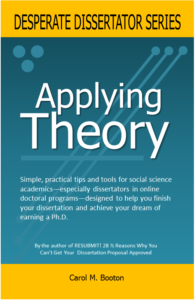Are you considering enrolling in graduate school? Do you have a secret yearning to get a Ph.D.? Are you wondering if you should enroll? Enrolling in graduate school is not a casual decision. Graduate programs can be lengthy, expensive, and disruptive. On the other hand, they can launch careers, increase earning, and boost self-esteem. Here are seven considerations to help you decide if you want to get a Ph.D.
1. My employer requires me to have a Ph.D.
Some employers require employees to get a Ph.D. For example, to teach at the university level, depending on your field, you will likely need a doctoral or professional degree of some kind (e.g., a Ph.D., D.B.A., or Ed.D.). Some research positions require doctoral degrees—biologists, anthropologists, earth scientists, and medical scientists, for instance. If you seek leadership positions in education, government, economics, or management, you may need a doctoral degree.
Educational institutions may differentiate between doctoral degrees and professional degrees. Doctoral candidates typically must conduct original research; candidates for professional degrees typically focus on practice rather than on research.
However, if you just want to teach somewhere, you may not actually need a doctoral degree. For example, many community colleges and vocational institutions require you to hold only a Master’s degree to teach. If teaching appeals to you, you may be able to satisfy your desire to teach without the investment of time and money needed to get the doctoral or professional degree.
Ten questions I wish I’d asked before I started my Ph.D. program
2. Having a Ph.D. will make me more employable
In some fields, having a doctoral degree may give you an advantage over those with only Bachelor’s or Master’s degrees. As the chart below shows, in 2015, the unemployment rate for people with doctoral degrees was 1.7%, compared to the average for all workers (4.3%).

Source: Vilorio, D. (2016, March). Education matters. Career Outlook, U.S. Bureau of Labor Statistics. https://www.bls.gov/careeroutlook/2016/data-on-display/education-matters.htm
Note that the Bureau of Labor Statistics differentiated between doctoral degrees and professional degrees. The amount of time to earn a doctorate or professional degree is similar. Completion of a doctoral degree (Ph.D.) or a professional degree usually requires at least three years of full-time academic work beyond a bachelor’s degree (Bureau of Labor Statistics, 2017, Education and Data Definitions, para. 1). Like doctorates, professional degrees can lead to careers in healthcare, government, and education.
However, people with professional degrees had the lowest unemployment rate of all (1.5%). If you are interested in a particular field, you may have more luck finding employment with a specialized professional degree or certification.
3. A Ph.D. will increase my income
In some cases, having a Ph.D. means you can command larger salaries, compared to salaries earned by those with only Bachelor’s or Master’s degrees. As shown in the chart above, in 2015, the median earning for people with doctoral degrees was $1,623 per week, compared to the average for all workers ($860). Income will vary by field—for example, engineering and math Ph.D.s are likely to earn more than philosophy and biology Ph.D.s earn.
However, earnings for those with professional degrees exceeded earnings for those with doctoral degrees ($1,730 to $1,623, respectively). If maximizing your income is your goal, a professional degree might be your best option. In addition, consider the earning time you lose and the student loans you rack up to earn your Ph.D. Would you be better off financially to enter the workforce with a Master’s degree?
4. Having a Ph.D. will make me smart
Ph.D.s become an expert in one aspect of one small part of one field. Does that mean you are smart? You will certainly read a lot in the process of earning a Ph.D. You will learn about the research process. You will learn to organize your thoughts and present them verbally and in writing. However, people have claimed Ph.Ds. possess only average intelligence. Read You Must Be Very Intelligent—The Ph.D. Delusion by Karin Bodewits.
Moreover, if you were motivated, you could learn to do all those skills without enrolling in a Ph.D. program. Many people become scholars of note without earning doctorates. For one example, read Secrets of a Buccaneer-Scholar by James Marcus Bach.
5. I need a Ph.D. to make a difference in the world
Having a Ph.D. can open doors in some fields. Prospective funders, donors, employers, and clients may find you more credible with those three letters after your name.
However, people sometimes ascribe mythical powers to the Ph.D. degree. You don’t need a Ph.D. to make a difference in the world. You can find many ways to share your wisdom with those who want and need it. Just Google “Making a difference in the world” and get going.

6. Having a Ph.D. will make me seem cool
Advanced degrees impress some people. Does being addressed as “Doctor” seem like the pinnacle of success to you?
However, coolness is earned, not made. “The Ph.D. . . . only looks like a big deal when you don’t have one” (Lemire, 2014). In addition, the amount of prestige and status you gain will likely depend on the school you attended and the degree you earned. In traditional academe, your institutional affiliation will direct your career path. What happens after you get the Ph.D. is as important as getting the degree.
7. Having a Ph.D. will help me feel better about myself
Earning a Ph.D. can be a self-esteem booster. If getting a Ph.D. is your lifelong dream, you should go for it. You might not succeed, but you won’t know unless you try. Even if you fail, you can still be a scholar without a Ph.D., if that is your dream.
However, if your sense of self-worth depends on earning a Ph.D., you’ve signed up for some serious self-imposed pressure. What will you do if you don’t finish the Ph.D.? Many people who enroll in doctoral programs don’t finish.
If research doesn’t float your boat, quit trying to paddle the leaky canoe against the current. Find the thing that suits you and give your gifts to the world. Don’t waste your valuable life energy doing something that doesn’t bring you joy. The world needs more people to delve deeply into the questions that need answering.
Moreover, lots of people never feel drawn to earn a Ph.D. and feel just fine about themselves.
What it is like to be a nontraditional learner at an online for-profit university
Complete these phrases with whatever comes to mind:
Without a Ph.D., I am . . .
People who don’t have doctorates are . . .
When I think of not earning a Ph.D., I feel . . .
The main reason I want a Ph.D. is to avoid being . . .
Did you use words like useless, worthless, stupid, or boring? I hope not. After trudging through years of the doctoral journey, some people have observed, if they had jumped off the Ph.D. hamster wheel sooner, they would have been happier, healthier, and less obsessed. They would have had better relationships and a renewed interest in life.
Earning a doctorate is not for everyone. It’s not easy, it takes a long time, it costs a lot of money, and it may not help you achieve your career objectives. However, if it’s too late, and you are already committed, go for it! Do your best. Let me know if you need some help.
Sources
Bach, J. M. (2011). Secrets of a buccaneer-scholar. New York, NY: Scribner.
Bureau of Labor Statistics (BLS). (2017, October 24). Occupational data definitions. Retrieved from https://www.bls.gov/emp/documentation/nem-definitions.htm
Lemire, D. (2014, March 17). Should you get a PhD? Retrieved from https://lemire.me/blog/2014/03/17/should-you-get-a-phd/
Vilorio, D. (2016, March). Education matters. Career Outlook, U.S. Bureau of Labor Statistics. https://www.bls.gov/careeroutlook/2016/data-on-display/education-matters.htm
Applying Theory

Dissertators often struggle to choose and apply a theoretical framework to their research projects. In this helpful guide, I offer suggestions from my own experience. In addition, I reveal how other dissertators have applied theory successfully and earned their doctorates.
Written in a friendly, nonscholarly manner, I demystify the challenges of applying academic theory to a research project. You will learn that theory is nothing to fear—in fact, we all use theory all the time! With the help of this powerful little book, you will learn to master theory and achieve your dream of earning your Ph.D.
Click here for more information.
Resubmit! 28 ½ Reasons Why You Can’t Get Your Dissertation Proposal Approved

This comprehensive book is the missing link for dissertators who have struggled to get their proposals approved. This indispensable book bulges with insights, suggestions, examples, diagrams, and practical tips, written especially for the online dissertator who may receive little support during the proposal process.
I present solutions to address twenty-eight potential reasons why you might be struggling to get your proposal approved. For example, you will learn how to write a clear problem statement, devise research questions and hypotheses, and align the elements of the proposal to facilitate speedy approval. I unlock the mysteries of Word and Excel to show you specifically how to use these tools for your proposals. Over 200 tables and figures show you exactly what to do. As a bonus, you will learn how to design a web-based survey and make a plan for fielding and analyzing the data. In this book, I cover it all to help you overcome obstacles and finish your dissertation.
Free templates and worksheets are available here.





